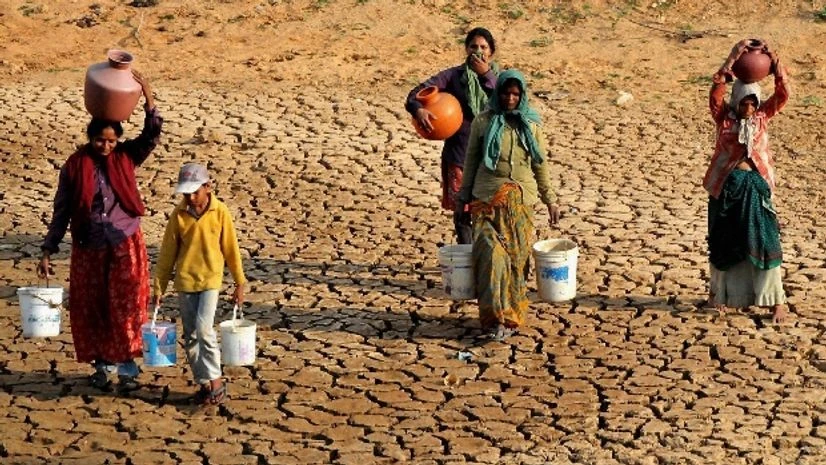Maharashtra needs an integrated drought relief policy and a separate department if it is serious about tackling the water scarcity issue, Observer Research Foundation Chairman Sudheendra Kulkarni has said.
"Maharashtra is reeling under the darkness of drought. This is more specific to Marathwada which has become the hotbed of distressed farmers dealing with the burgeoning water scarcity, unpredictable rains and cyclical crop failures," Kulkarni told reporters after presenting Chief Minister Devendra Fadnavis a report at the Secretariat on drought in Marathwada.
Read more from our special coverage on "DROUGHT"
- PM to meet CMs of three drought-hit states
- Rural income adversely affected due to natural calamities: Govt
- Centre now plans to transport fodder in drought-affected states through Indian Railways
- Crops disappear from Telangana farms as water table drops
- Odisha govt moves to mitigate drinking water scarcity
"All this has led to the collapse of the existing economic and social structure of the region. Several reasons and corresponding solutions for tackling the drought have been discussed year after year by successive governments, but mostly in isolation," he said.
The need for this policy and a holistic approach has been brought out in the research report compiled by the Observer Research Foundation (ORF) Mumbai.
The ORF Mumbai team was invited to present their findings and recommendations, from the report, to Collectors of all drought-hit districts in the state.
"If we study the issue of drought in depth, it is observed that a parallel economy has emerged in the rural areas," Kulkarni said.
From manufacturing water pouches, to running tanker mafias, indulging in power theft, illegal transportation, money-making godmen, sand-mafia and even agents for government scheme implementations, every small village has these elements. No scheme or project will be successful until these links are destroyed, he opined.
"All these observations have led us to believe that there is a pressing need for an integrated drought relief policy. To implement this policy, the Maharashtra government needs to form a separate Drought Relief Department on the lines of a Climate Change Department that was established by the central government," he said.
Kulkarni said this will ensure that departments do not pass the buck anymore and all the issues are controlled through a single authority.
This concept is not new to Maharashtra, and was brought in by Shahu Maharaj in the early 1900's. He had appointed a separate minister Bhaskarrao Jadhav to head an exclusive drought relief department, he revealed.
The report is an outcome of the year-long effort of
ORF Mumbai's 'Maharashtra Adhyayan Kendra' and 'Vikas Adhyayan Kendra'. The team conducted extensive field visits and interactions with stakeholders in all eight districts of Marathwada before compiling the report.
Several questions ranging from finding the actual reasons of drought, who the most affected people were, and finally the hunt for real solutions formed the hypothesis of the report.
"Our research aimed at answering these questions and giving some honest solutions to this colossal and multi-faceted issue. What proved to be a promising indicator for our report is the success stories in Marathwada that have been interwoven in all our sections," Kulkarni said.
"Throughout the world, Maharashtra is facing flak for not being able to tackle the drought situation efficiently. At such a time, our report not only points out at the reasons, but also looks at how the state can learn from its mistakes," he said.
It concludes with recommendations to the state government, non-governmental organisations and even the common man on how these stakeholders can help in averting the drought.
"Several schemes floated by successive governments to tackle drought have failed to reap the desired results despite the millions spent on them. Yet there seems to be a lack of enthusiasm in looking for long-term and integrated solutions.
"The mistakes that have been committed cannot be pushed under the carpet. These are crimes committed by governments that have destroyed families, pushed many to die, and others to migrate," Kulkarni said.
"We do not claim that this report covers every small aspect of the drought crisis. But through our year-long research, we have put a sincere effort into finding ways and means to mitigate this calamity that is recurrent in Maharashtra," he added.

)
